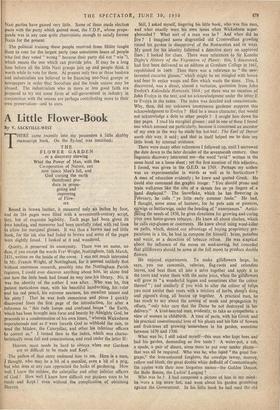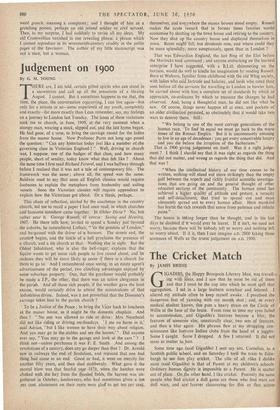A Little Flower-Book
By V. SACKVILLE-WEST
THERE came recently into my possession a little shabby manuscript book. On the fly-leaf was inscribed:
THE • FLOWER GARD.EN or a discovery. shewing What the Power of Man, with tits Co-operation of Nature, can now (since Man's fall, and God cursing the earth therefrom) pro- duce in propa- gating and improving of Flow- ers.
Bound in brown leather, it measured only six inches by four, and its 164 pages were filled with a seventeenth-century script, tiny, but of exquisite legibility. Each page had been given its Own heading, and moreover had been carefully ruled with red lines to allow for marginal glosses. It was thus a brown and red little book, for the ink also had faded to brown and some of the pages were slightly foxed. I looked at it and wondered.
Quietly, it preserved its anonymity. There was no name, no date, if you except the words Fras Wright, Nottingham, 16th March, 1831, written on the inside of the cover. I was not much interested in Mr. Francis Wright, of Nottingham, for it seemed unlikely that without enormous research, possibly into the Nottingham Parish registers, I could ever discover anything about him, let alone find out how the little book had found its way into his library. No, it was the identity of the author I was after. Who was he, this patient meticulous man, with his beautiful handwriting, his ruler hnd his red pencil, his extreme neatness, his manifest leisure and is piety ? That he was both censorious and pious I quickly discovered from the first page of the introduction, for after a reference to " this rude lumpe and confused heape " the Earth, which has'been brought into form and beauty by Almighty God, he proceeds to a condemnation of his own times, " wherein Wickedness superabounds and as it' were forceth God to withhold the rain, to send the Mildew, the Caterpillar, and other his inferiour officers to correct us." I turned then to the index, which was charac- teristically most full and conscientious, and read under the letter H:
Heaven. must needs be hard to obteyn when our Gardens are so difficult to be made and Kept.
The pathos of that entry endeared him to me. Hera is a man, I thought, who may be a bit of a moralist, even a bit of a prig, but who does at any rate appreciate the balks of gardening. How well I knew the mildew, the caterpillar and other inferior officers of God 1 How well I knew how difficult our gardens were to be made and Kept I even without the complication of obtaining Heaven.
Still, I asked myself, fingering his little book, who was this man, and what exactly were his own times when Wickedness super-
bounded ? What sort of a man was he ? And when did he live ? I imagined some disgruntled old Cromwellian growling round his garden in disapproval of the Restoration and its ways. IVIy quest for his identity followed a detective story on approved lines ; I looked for clues. There were references to Sir Kenelm Digby's History of the Vegetation of Plants: this, I discovered, had first been delivered as an address at Gresham College in 1661, republished in 1669. Then there was a reference to " the new- invented cucurbit glasses," which might be set mingled with honey and beer to entice wasps and flies which waste the store. This, I discovered, was a direct, almost a verbatim, quotation from John Evelyn's Kalendula Hortensis, 1664 ; yet there was no mention of John Evelyn in the text, and no acknowledgment under the letter E to Evelyn in the index. The index was detailed and conscientious. Why, then, did my unknown anonymous gardener suppress this acknowledgment to Evelyn ? Had he a mean character, that would not acknowledge a debt to other people ? I sought him down his tiny pages. I read his marginal glosses ; and in one of these I found one which amused me particularly, because it concerned an ancestor of my own in the way he made his hot-bed : The Earl of Dorset useth this way, it said ; and that in itself helped me to date my little book by internal evidence.
There were many other references I followed up, until I narrowed the date down to the later decades of the seventeenth century. One linguistic discovery interested me—the word "avid " written in the same hand on a loose sheet ; yet the first mention of this adjectiv3, I found, was given in the O.E.D. as '1769. Perhaps my author was an experimentalist in words as well as in horticulture ?
cman of education evidently ; he knew and quoted Greek. He ould also command the graphic image: " You should prune and train wall-trees like the ribs of a skreen fan or ye fingers of .a pand displayed." The Snowflake, which he has flowering in ebruary, he calls " ye little early summer foole." He had, thought, some sense of humour, for he puts ants or pismires, earwigs or battlerwigs, under the heading of " annoyances." Antici- bitting the needs of 1950, he gives directions for growing and curing your own home-grown tobacco. He knew all about cloches, which he calls cap-glasses or casements. He knew about using weed-killer on paths, which, denied our advantage of buying proprietary pre- parations in a tin, he had to compose for himself: brine, potashes and water, or a decoction of tobacco refuse. He was sceptical about the influence of the moon on seed-sowing, but conceded that gilliflowers should be sown at the full moon to produce double flowers.
He enjoyed experiments. To make gilliflowers large, he says, you use camomile, valerian, flag-roots and celandine leaves, and beat them all into a salve together and apply it to the roots and water them with the same juice, when the gilliflowers will grow to " a wonderful bignes and sometimes alter the colour thereof " ; and similarly if you wish to alter the colour of tulips you must anoint their roots with a mixture of herbs, sheep's dung and pigeon's dung, all beaten up together. A practical man, he has much to say about the sowing of seeds and propagation by offsets, " only take care that the Dame be not destroyed in her delivery." A kind-hearted man, evidently, to take so sympathetic a view of women in childbirth. A man of parts, with his Greek and his practical unsentimental love of his plants and his lists of flowers and fruit-trees all growing 'somewhere in his garden, sometime between 1670 and 1700.
What was he, I still asked myself—this man who kept bees and had his garden, demanding so few tools ? A water-pot, a tub, a spade, a pair of shears, some mats to put over tender plants— that was all he required. Who was he, who listed " the great fox- grape," the iron-coloured foxglove, the cowslips tawny, murrey, yellow and blush, the great double white daffodil of Constantinople, the apples with their now forgotten names—the Golden Doucet, the Belle Bonne, the Ladies' Longing ?
Who was he.? I had composed a picture of him in my mind: ho wore a big straw hat, and went about his garden grumbling against the Government. In his little book he had used the old
word grouch, meaning a complaint ; and I thought of him as a grutching person, perhaps an old retired soldier or civil servant. Then, to my surprise, I had suddenly to revise all my ideas. My old Cromwellian vanished in one revealing phrase, a phrase which I cannot reproduce in its seventeenth-century crudity in the polite pages of the Spectator. The author of my little manuscript was not a man, but a woman.















































 Previous page
Previous page